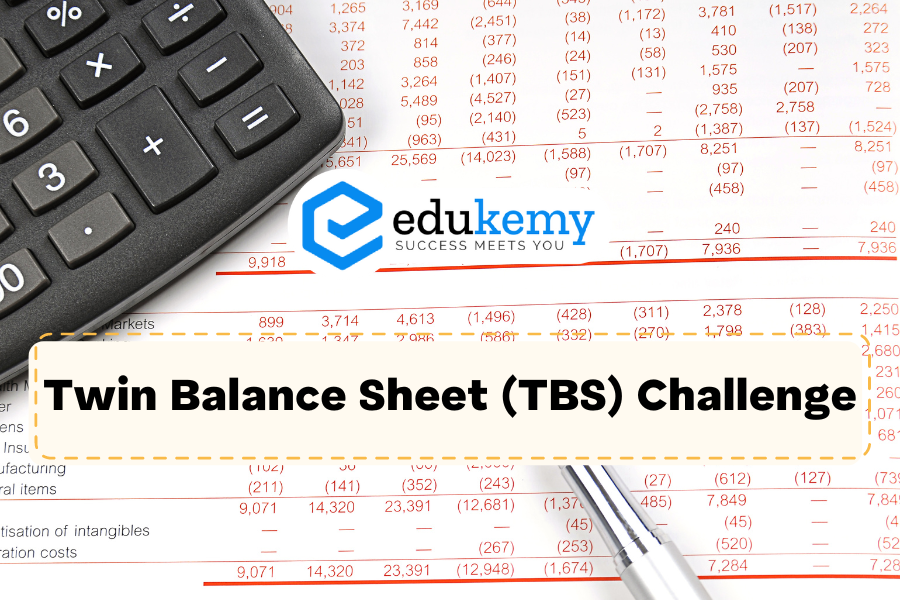
The Twin Balance Sheet (TBS) challenge in India refers to a situation where both companies and banks are burdened with financial distress, leading to a complex and interconnected problem. The root of the issue lies in overborrowing by companies, which, unable to generate expected returns on investments, struggle to repay loans. This, in turn, results in banks accumulating non-performing assets (NPAs) as the loans extended to these distressed companies turn bad.
Contents
- 1 FAQs
- 1.1 1. What is the Twin Balance Sheet (TBS) Challenge?
- 1.2 2. What are the causes of the Twin Balance Sheet Challenge?
- 1.3 3. What are the consequences of the Twin Balance Sheet Challenge?
- 1.4 4. How can the Twin Balance Sheet Challenge be addressed?
- 1.5 5. What role do policymakers play in managing the Twin Balance Sheet Challenge?
- 2 In case you still have your doubts, contact us on 9811333901.
Key Points:
- Companies Overborrowing and Distress:
- Companies borrowed extensively for investments that did not yield anticipated returns.
- The inability of these companies to repay their loans has led to financial distress.
- Banks Mired in NPAs:
- Banks, having extended loans to these distressed companies, find themselves dealing with a significant volume of NPAs.
- Impact on Balance Sheets:
- The balance sheets of both borrowing companies and lending banks are under pressure due to the TBS challenge.
- Impact on Private Investment and Growth:
- The TBS challenge is a critical issue as it hampers private investment in the country.
- The overall economic growth across sectors is adversely affected by this challenge.
- Government Measures:
- The government has introduced several measures to address the TBS challenge, including the implementation of the Insolvency and Bankruptcy Code (IBC), recapitalization of banks, and other reforms.
- Persistent Challenge:
- Despite government interventions, the TBS challenge persists, highlighting its complexity and the need for comprehensive solutions.
- Economic Survey 2016-2017 Recommendation:
- The Economic Survey 2016-2017 proposed a dedicated body, referred to as the Public Sector Asset Reconstruction Company (PARA).
- PARA would function as a special purpose vehicle with the specific task of acquiring the most significant and complex NPAs and subsequently disposing of them.
Recommendation Rationale:
- Establishing PARA aims to concentrate efforts on addressing the most challenging and complex NPAs.
- The dedicated focus on handling large NPAs is expected to expedite the resolution process and mitigate the TBS challenge more effectively.
The TBS challenge represents a significant obstacle to India’s economic health, and addressing it requires sustained efforts, innovative solutions, and collaborative action between the public and private sectors.
FAQs
1. What is the Twin Balance Sheet (TBS) Challenge?
A: The Twin Balance Sheet (TBS) Challenge refers to a situation in which both banks and corporations within an economy face financial distress simultaneously. It commonly arises when banks have high levels of non-performing assets (NPAs), leading to a weakened banking sector, while corporations struggle with excessive debt burdens, hindering their ability to invest and grow.
2. What are the causes of the Twin Balance Sheet Challenge?
A: The TBS Challenge typically stems from a combination of factors including lax lending practices by banks, economic downturns, asset price bubbles, and inadequate risk management. Banks may have extended loans to corporations without proper assessment of creditworthiness, leading to a build-up of NPAs. Concurrently, corporations may have overleveraged themselves during periods of easy credit, making them vulnerable to economic shocks.
3. What are the consequences of the Twin Balance Sheet Challenge?
A: The consequences of the TBS Challenge can be severe and far-reaching. It can lead to a credit crunch as banks become reluctant to lend, hindering economic growth. Corporations burdened with high debt levels may struggle to service their obligations, resulting in bankruptcies, layoffs, and reduced investment. Overall, it can exacerbate economic downturns and prolong the recovery process.
4. How can the Twin Balance Sheet Challenge be addressed?
A: Addressing the TBS Challenge requires a multi-pronged approach involving both monetary and fiscal measures. This may include recapitalizing banks to strengthen their balance sheets, implementing structural reforms to improve corporate governance and transparency, facilitating debt restructuring for distressed firms, and enhancing regulatory oversight to prevent future crises. Additionally, promoting economic growth through supportive policies can help alleviate the strain on both banks and corporations.
5. What role do policymakers play in managing the Twin Balance Sheet Challenge?
A: Policymakers play a crucial role in managing the TBS Challenge by implementing appropriate policies to restore financial stability and stimulate economic recovery. This may involve coordinating efforts between monetary authorities, regulatory agencies, and fiscal authorities to provide liquidity support, enact reforms, and foster a conducive environment for sustainable growth. Timely and decisive action is essential to mitigate the adverse effects of the TBS Challenge and restore confidence in the financial system.
In case you still have your doubts, contact us on 9811333901.
For UPSC Prelims Resources, Click here
For Daily Updates and Study Material:
Join our Telegram Channel – Edukemy for IAS
- 1. Learn through Videos – here
- 2. Be Exam Ready by Practicing Daily MCQs – here
- 3. Daily Newsletter – Get all your Current Affairs Covered – here
- 4. Mains Answer Writing Practice – here

